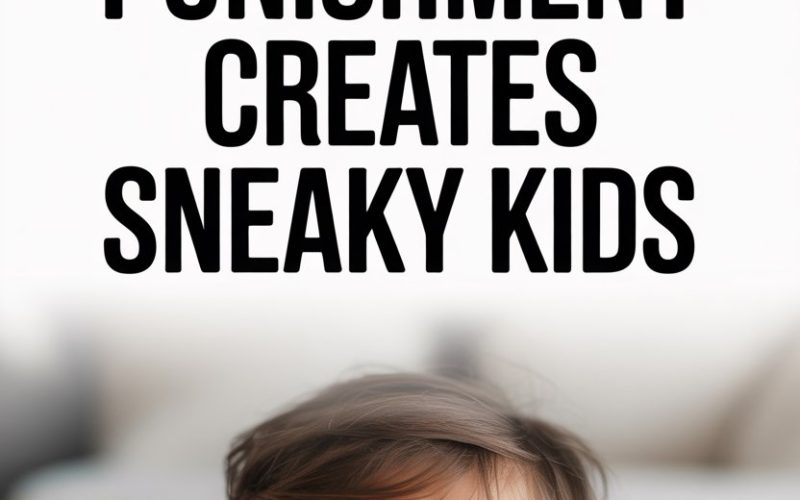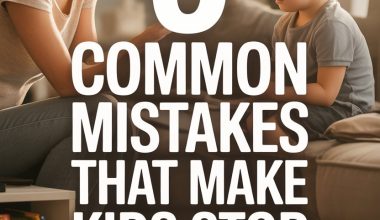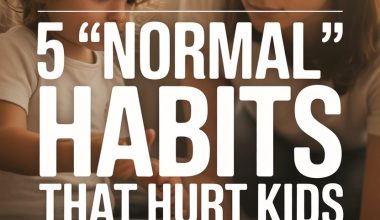Parenting is not for the faint of heart.
Every day is a masterclass in improvisational theatre, complete with tears, giggles, lies, and a fair amount of jam on the walls.
One universal truth emerges as soon as your little one can crawl: the more you clamp down, the cleverer they get at wriggling out.
Ever wondered why the stricter the household, the better the kids are at hiding their tracks? The science — says it’s no accident.
The Lure of the Forbidden Fruit
Put yourself in your child’s shoes. You’ve just been told, in no uncertain terms, not to touch the biscuit tin. You can almost hear it calling your name.
The more you’re threatened with ‘consequences’, the more that shortbread starts looking like the Holy Grail.
Psychologists call this reactance — an urge to reclaim freedom when it’s threatened. (National Library of Medicine).
Tell a child “Don’t,” and they want to know, “But… what happens if I do?” Sure, they might obey — while you’re watching. The moment you’re out of sight, curiosity, and a dash of rebellion take the reins.
Punishment Teaches Secrecy, Not Responsibility
A child punished for spilling the milk learns something very specific: don’t get caught spilling milk.
The next time, they’ll be careful to wipe it up quickly, or blame the dog, or claim “It was already like that!”
Skills for a future spy? Maybe. Accountability? Not so much.
Punishment focuses attention on avoiding detection, not fixing mistakes. (Journal of Safety Research).
If a child fears your reaction, honesty becomes a liability. Over time, they get very good at hiding evidence — and not so good at learning from their blunders.
Why Kids Lie (and Get Better at It)
Lying isn’t just a moral failing. It’s also a developmental milestone. Young children experiment with fibbing as soon as they realise adults can’t read their minds. (Independent on why kids lie).
The more severe the punishment for mistakes or misbehaviour, the more motivated they become to “cover their tracks.”
A classic study (American Psychological Association) found that children subject to strict discipline were MORE likely to lie, and that their lies became more sophisticated with practice.
Give them enough incentive, and even the most transparent toddler can evolve into a pint-sized Houdini.
Shame and Fear Don’t Teach Values
Punishment might make a child comply on the surface, but it doesn’t build empathy or conscience.
Ever heard your child say, “I’m sorry!” with all the remorse of a tax auditor? That’s compliance — not genuine understanding.
Real learning comes from feeling safe enough to admit, “I messed up.”
If the only thing at stake is a loss of privileges, a scolding, or the dreaded time-out, the lesson is just: “Avoid getting found out next time.”
The result? Kids who are experts at managing appearances but clueless about managing feelings.
Punishment Creates an Adversarial Relationship
If every mistake is met with an immediate penalty, children start to see parents as the enemy, not the coach.
Picture your home as a low-budget version of ‘Mission Impossible’, with you as the security guard and your child as the cat burglar. Not exactly the nurturing family vibe most of us are after.
Experts like Dr. Laura Markham argue that when children fear punishment, honesty feels risky. Trust erodes.
Kids start thinking, “If I tell Mum what really happened, I’ll be in trouble.” Much easier to keep quiet, fudge the truth, or blame the sibling.
Punishment Doesn’t Address the Root Cause
Spilled paint, a broken mug, a punch-up over the last biscuit — every misbehaviour, big or small, has a reason.
Punishment zooms in on the act but ignores the motivation. Is your child tired? Angry? Jealous of the new baby? Pushing boundaries to see if you’ll still love them?
When the focus stays on what they did, not why they did it, the same behaviour crops up again — just better hidden.
Understanding the cause is how you can finally sidestep the endless cycle of “Who did this?” and “It wasn’t me!”
Logical Consequences vs. Old-School Punishment
Consequences aren’t the enemy. The trick is keeping them logical, related, and respectful.
For example, if a child throws a toy, the toy goes away for a bit. Not forever. Not a week in solitary. And definitely not a lecture about “kids in my day.”
Logical consequences encourage kids to make amends and try again. Punishment, on the other hand, just leaves them stewing. (Positive Discipline Association).
What to Do Instead: Encouraging Openness and Growth
Wondering how to actually get children to own up to mistakes instead of covering them up? A few reliable tactics can change the vibe in your home almost overnight:
Build Connection Before Correction
Kids listen to people they feel close to.
When your child feels safe and loved, they’ll tell you the truth — even the embarrassing, sticky, or slightly illegal bits (like that time with the permanent marker and the cat).
Try a quick cuddle before you talk about what happened. Sit at their eye level. Keep your tone gentle, even if your inner volcano is threatening to erupt.
The connection sets the stage for honest conversations.
Ask Curious Questions
Instead of “Who did this?” (spoiler: you already know), ask, “Can you help me understand what happened?” This shifts the conversation from detective work to teamwork.
Kids are more likely to open up when they don’t feel interrogated. Curiosity invites honesty.
And you can always sprinkle in a bit of humour. “I see the biscuit tin has been raided. Any idea which ninja was involved?”
Focus on Making Things Right
If a rule is broken or someone gets hurt, steer the conversation toward solutions. “How can we fix this?” or “What do you think would help next time?”
You’ll be amazed at how creative kids can be when given a chance to repair the damage.
This approach builds both responsibility and empathy — with no need for threats or bribes.
Model Honesty Yourself
It’s hard for kids to own up to their mistakes if adults never do the same. Forgot to send in that school permission slip? Spilled juice on your work laptop? Fess up, apologize, and show how you put things right.
Children who see adults being honest (and surviving) get the message that mistakes are normal and fixable.
Reframe Mistakes as Learning Opportunities
Imagine a world where “I messed up” isn’t followed by a punishment, but by, “What can we learn from this?” Suddenly, mistakes aren’t shameful — they’re part of growing up.
Sounds like wishful thinking? Dr. Daniel Siegel’s research shows that children who are allowed to make mistakes and talk about them without fear of punishment become more resilient, capable, and honest.
A Quick Note for Busy Parents
You might be thinking, “This sounds lovely, but I don’t have time for deep chats about emotional growth when we’re already late for football, dance, and picking up the dry cleaning.” Fair enough.
Even small changes help. Try swapping out “You’re in big trouble!” for “Looks like things got out of hand. How can we fix this together?”
Maybe ask a curious question at bedtime. Or just pause for a second before you respond, giving your child a chance to speak up.
No one expects perfection. (If perfect parents existed, the rest of us would have been sacked years ago.)
When Natural Consequences Are Enough
Sometimes, life delivers its own consequences. Forgetting the raincoat? A soggy walk home. Not feeding the guinea pig? A grumpy guinea pig.
No need to pile on extra punishment. A little empathy (“That’s rough, mate. Bet you’ll remember next time.”) goes a lot further than a lecture.
When You Mess Up
Every parent loses their cool eventually. If you snap, yell, or even punish, don’t panic.
Repairing the relationship — a quick apology, a hug, a bit of honesty about your own stress — matters more than any single mistake.
Your child will learn that grown-ups aren’t robots either, and that making amends is just part of being a family.
The Real Result: Kids Who Trust You
Swapping punishment for connection and curiosity isn’t just about having fewer lies and more confessions. It’s about raising kids who trust you enough to share their triumphs and disasters, big and small.
The more children feel safe to be honest, the less they need to hide.
The sneaky behaviour fades, the relationship deepens, and, just maybe, you’ll find fewer biscuit crumbs under the sofa cushions.
Raising Honest Kids Isn’t a Magic Trick
There’s no spell or sticker chart for raising kids who own their mistakes. It’s more like an endless game of snakes and ladders, with setbacks, surprises, and the odd leap forward.
But ditching punishment for honest connection gives your child a safe place to learn, stumble, and grow.
And who knows?
Next time the biscuit tin goes missing, they might just come straight to you — with the crumbs still on their lips.





